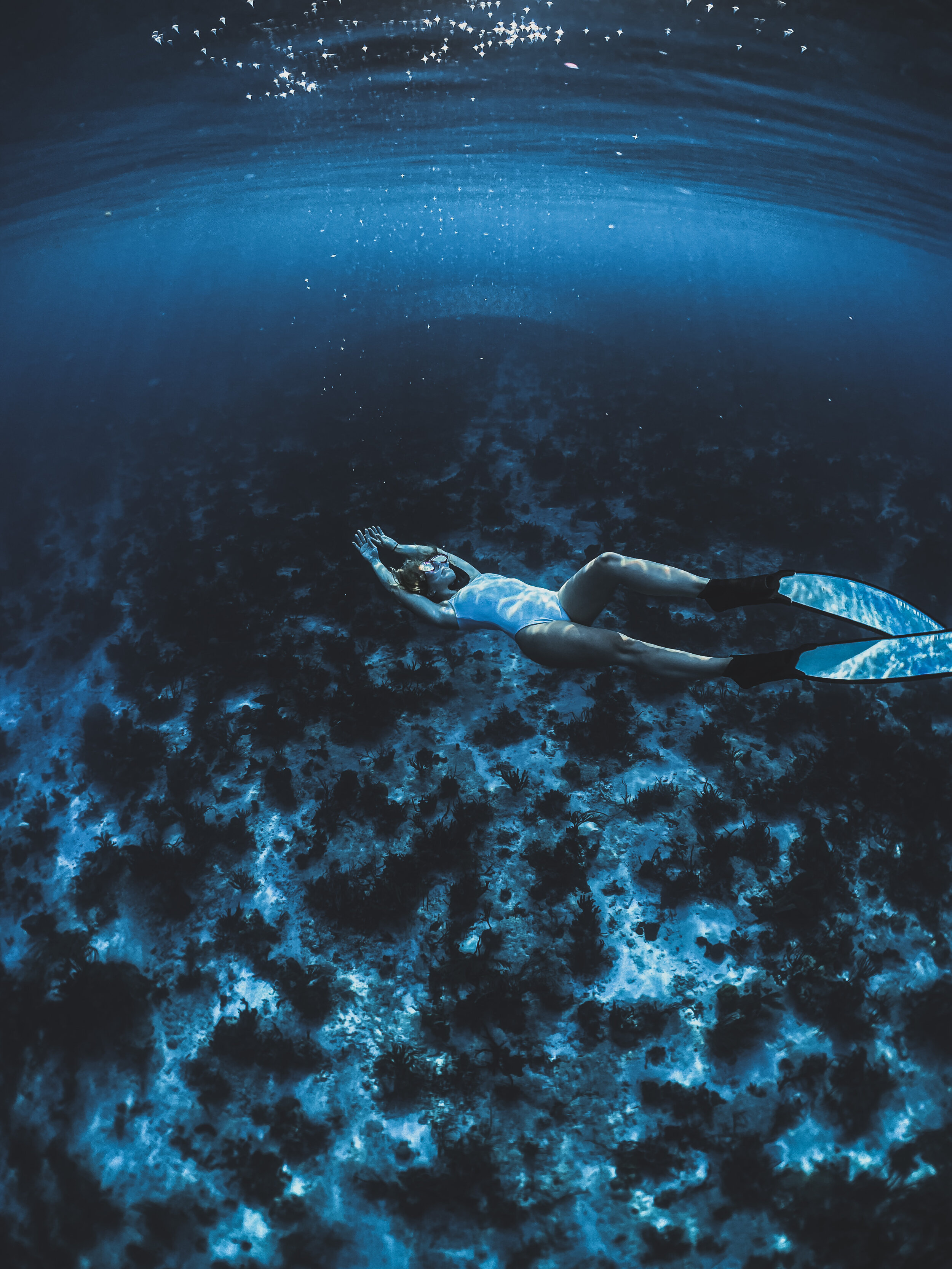“We are water. We move around in air, so we think we are air. We forget about the watery world we came from.”
picture by John Kowitz
I recently started my journey into the world of freediving and so far, it’s been magical. Freediving offers more opportunities to see marine life and it’s a great complement to scuba diving.
I like freediving because it’s the most direct and intimate way to connect with the ocean. Freediving is all about letting go, all the distractions of life are left at the surface. As soon as I get in the water, all the mental garbage, all the internal chatter, all that stuff goes away. It’s like going wandering around the universe. I enter the ocean in peace with myself and surroundings and I almost forget about everything else. I feel like I can fly and like the ocean is giving me a big hug. I can watch fishes dance under the coral or watch the sun from the other side of the world. And when my body isn’t underwater, my mind certainly is.
I always say that I’m an Ocean Child because we’re more closely connected to the ocean than most people would ever suspect. We’re born of the ocean. We’re water babies. We swam before we could walk or breathe but then we forgot.
Close Encounters of the Aquatic Kind
Freediving is more than just holding your breath, it’s a perception shift, I think I personally experienced this perception shift when diving with sharks. It feels like you’re peacefully cohabitating with the water and its inhabitants. I can still remember a dive at Danger Cay in The Bahamas where Caribbean Reef Sharks would swim all around me and I couldn’t do anything but watch in awe the sun rays reflecting on their back and the clear deep blue.
Many of the researchers are freedivers. It’s a quick and efficient way to access and research the ocean’s most mysterious animals.
“The best way to observe a fish is to become a fish.”
If I still haven’t convinced you yet, here are some of the health benefits of freediving:
Improves fitness and flexibility
Improves focus and mental clarity
More self-confidence
Better water safety
Increased oxygen efficiency
Increased lung function
Better nutrition
Relieves stress
Brings body consciousness
Teaches discipline
On One Breath: What the Freediving World Can Teach Us About Stress, Anxiety, Mindfulness, and Living In the Moment
‘‘But for us normal folk, freediving can reveal a whole new side of ourselves we don’t know exists; this power we possess not just physiologically but mentally. Yogis and regular meditators get it: the power of mindfulness, the power of our breath to keep us focused and present. But free divers seem to understand this on a deeper level. Maybe it’s the element of water—this deeply ingrained, evolutionary relationship we have with the water which most of us become disconnected from early in life—maybe that is the missing link to the inexplicable, deeper level of peacefulness. It’s as if freedivers have found the missing ingredient to peace, joy, and being able to stay truly in the moment, even if for just one breath—and the power of our breath to transform our lives.
French freediving champion Guillaume Nery said it best: “Breathing gives rhythm to our lives. Learning how to breathe better is learning how to live better.”
I love when life reminds me how interconnected it all is, and how powerful our bodies really are.’’
If you want to learn more about freediving, I really recommend the following book. DEEP: Freediving, Renegade Science, and What the Ocean Tells Us About Ourselves by James Nestor.
Deep is a voyage from the ocean's surface to its darkest trenches, the most mysterious places on Earth. Fascinated by the sport of freediving - in which competitors descend to great depths on a single breath - James Nestor embeds with a gang of oceangoing extreme athletes and renegade researchers. He finds whales that communicate with other whales hundreds of miles away, sharks that swim in unerringly straight lines through pitch-black waters, and other strange phenomena. Most illuminating of all, he learns that these abilities are reflected in our own remarkable and often hidden potential - including echolocation, directional sense, and the profound bodily changes humans undergo when underwater. Along the way Nestor unlocks his own freediving skills as he communes with the pioneers who are expanding our definition of what is possible in the natural world - and in ourselves.





